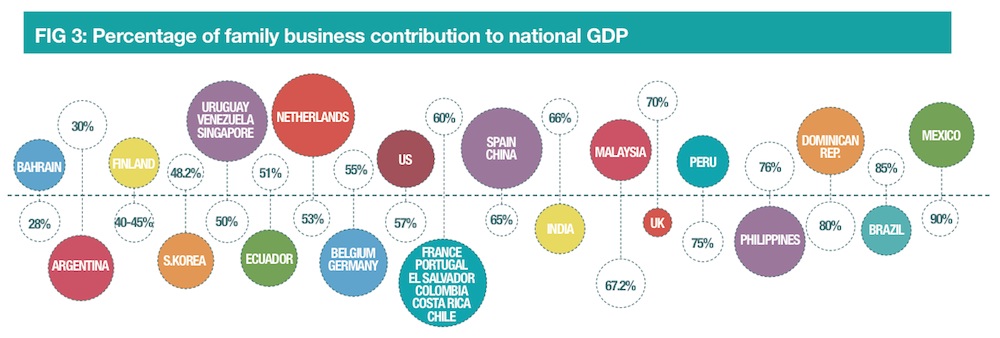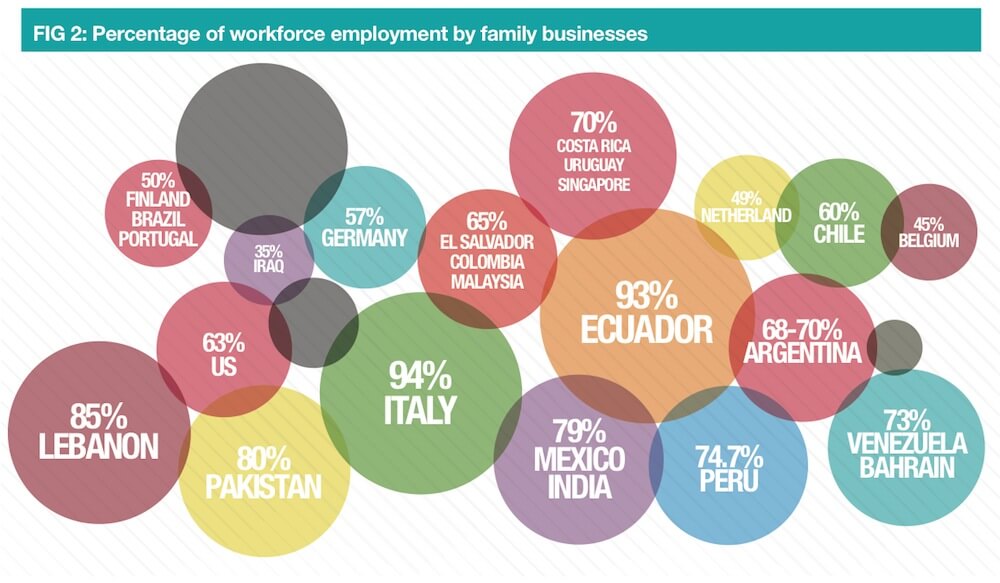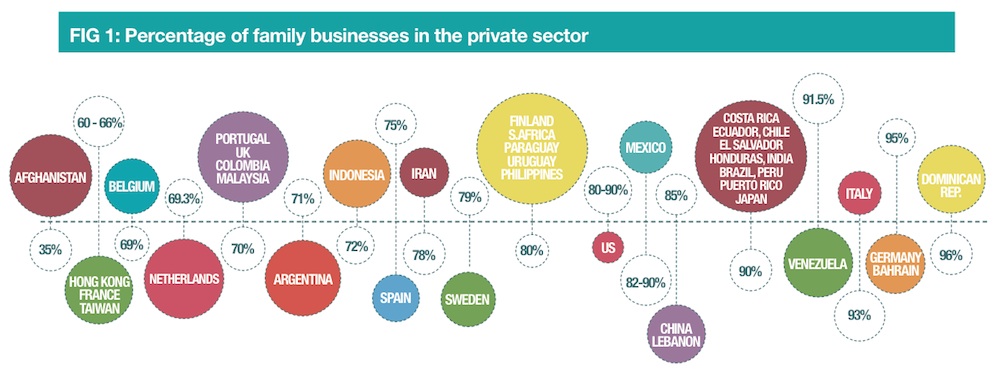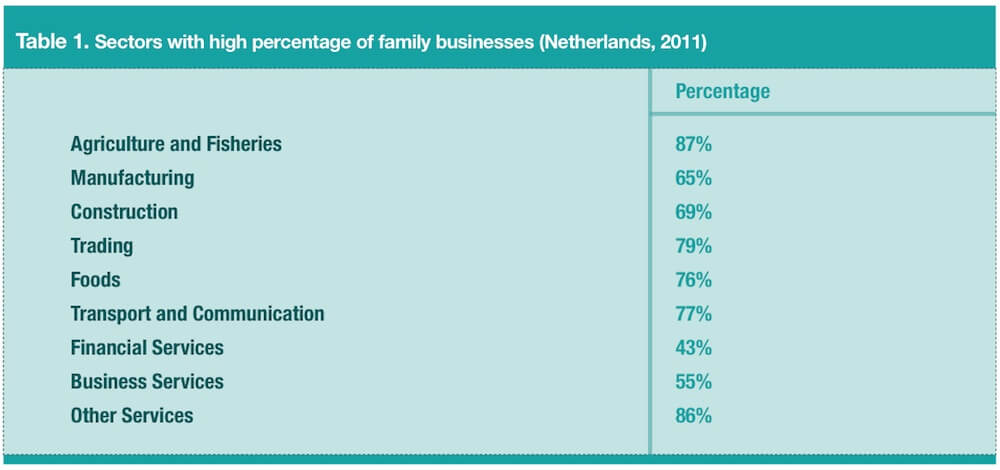Image source; Pixabay via Pexels
The family business is the most frequently encountered ownership model in the world and their impact on the global economy is considered to be significant. Despite their great number, the academic and business community have yet to define uniformly what exactly constitutes a family business. The long-running debate has never garnered conclusive results. When defined as businesses that are majority-owned by a single family’s members, it is estimated that the total economic impact of family businesses to global GDP is over 70%. Discovering the additional means by which families contribute is the main purpose of the following overview that was created by consulting over 40 studies and including countries from all continents.
What we know about the economic impact of family businesses
Before diving into the facts and figures, let us review what is commonly known about family businesses and the contributions they make to their respective economies:
1. Family businesses show higher profitability in the long run.
2. Family businesses are less likely to lay people off and more likely to hire despite the possibility of an economic downturn.
3. Family businesses are more likely to give charitably to their respective communities and engage in extensive philanthropic activities.
4. Family businesses have a more long-term strategic outlook due to their main motivation consisting of creating a legacy for generations to come.
5. Family businesses are less likely to raise debt and are widely deemed financially prudent.
In spite of these promising qualities, it is also known that merely 30% of family firms make it to the 2nd generation and only a third because of that survive to the 3rd generation. Usually, family conflict is the impetus of this disappointing statistic. However, another factor may come into play. The institutional environment family businesses operate within may not always recognise their importance and do not provide much support. Therefore, while family businesses undoubtedly have an impact on the economy at large, the question is often raised of whether economic institutions are engaging enough to safeguard the survival of family-owned companies.
 Measuring Impact – A Numbers Game
Measuring Impact – A Numbers Game
While the virtues of family business are often lauded, how much of their economic impact is duly measured? To fully grasp the sway these enterprises have on the world’s bottom line it is important to gather the figures available. The lack of a unified definition of what constitutes a family business however, makes this task increasingly difficult. For the sake of this article, a family business will be considered a company that is controlled and majority-owned by members of the same family. It is not possible to adjust all statistics to this definition, but for the most part national data will allow for such a generalisation.
We have collected statistics based around the following indicators allowing for analysis that points to family businesses having a considerable impact on their respective economies:
1. Percentage of family businesses in the private sector. (Fig. 1)
2. Percentage of workforce employment by family businesses. (Fig. 2)
3. Percentage of family business contribution to national GDP. (Fig. 3)
By looking at these numbers we can begin to understand not only the importance of family businesses within their national economies, but also how crucial their survival is for the stability of various nations.
 Importance by sector and size
Importance by sector and size
The impact of family businesses can also be considered by economic sector. In the Netherlands for instance, the highest concentration of family-owned businesses can be found in agriculture. This constant for the Dutch can be found repeated in many other economies around the world. Another key pattern to consider is the high concentration of family ownership found among small and medium-sized enterprises in real economy sectors such as agriculture, manufacturing and construction. Among small and medium-sized companies, the percentages of family businesses can reach as high as 98% and the employment rate for family-owned SMEs is typically more than 65%.
Global gaps
There are considerable parts of the world where the role of family businesses is largely undocumented. Key regions such as Africa, the Middle East and large parts of Asia have long gone unstudied. The difficulty that results from having no accurate data on the role of family businesses in these economies in turn leads to a lack of understanding on how family businesses can expand their roles in supporting their economies and what aid can be provided by government institutions to enable their sustainability.
 Better impact for the future
Better impact for the future
The bearing of family businesses on national economies is undeniable, however this influence is not uniformly documented. More efforts should be directed towards studying the contribution of family businesses in order to establish the proper institutional frameworks to support their longevity.
Tharawat Magazine, Issue 22, 2014
Sources:
1) A BACKBONE FOR BAHRAIN, Campden FB, 2007
2) Financing challenges facing Bahrani Businesses, KMPG, 2014
3) Family-owned businesses – the backbone of India’s economy, KMPG, 2013
4) Family Businesses at the Forefront of Global Change, IMD, 2011
6) CII Family Business Network India Chapter, CII
8) Family Business in Singapore Case Studies, CPA Australia & KMPG, 2013
9) The longevity of family firms in Japan, KMPG, 2014
13) Family businesses in Pakistan share corporate governance stories, CIPE, 2011
14) Family Managed Businesses in India – The Opportunites And The Challenges, Center for Family Managed Business (FMB)
15) Supporting Iraq’s move to market economy, Swedish International Development Cooperation Agency, 2012
17) Philippines’ elite swallow country’s new wealth, Inquirer Business, 2013
18) In Search of Good Governance for Asian Family Listed Companies: A Case Study on Hong Kong, Hong Kong Baptist University, 2007
19) In Japan, importance of family business opens up opportunities, Marketplace, 2012
20) Handbook of Family BUsiness and Family Business Consultation, Florence Whiteman Kaslow, 2012
21) Investigacion, Exaudi
22) La Empresa Familiar En Chile Y El Impacto De La Cultura Latina, IDDE
23) Empresas Familiares en Mexico, KMPG, 2013
24) Empresas Familares, Universidad de Malaga, 2009
25) Empresas Familiares: Lo primero es el negocio, KMPG, 2012
26) 5 claves para alagar la vida de tu empresa familiar, Forbes Mexico, 2013
27) Dia Internacional de la Empresa Familiar
28) Importancia de las empresas familiares, Grandes Pymes, 2010
29) Pesquisa do Sebrae mostra que as empresas familares sao 90% do total, Ojornalde Hoje, 2012
30) Importancia economica da empresa familiar, Universidade de Passo Fundo, 2009
31) Empresas familiares geram 50% dos empregos no Brasil, CIC, 2007
32) Familias Empresarias en Chile: sus caracteristicas y aporte al pais, ESE Business School, 2012
33) Famiempresas: fuente importante de la economia colombiana, Cultura, 2008
34) Son el soporte de la economia, El Colombiano
35) Empresas que generan mas riqueza son familiares, Consecomercio, 2012
36) El 90% de las empresas en el Peru son de tipo familiar, La Republica, 2013
37) El 79% del empleo en el Peru es informal, Peru21, 2014
38) Celebran Dia Internacional de la Empresa Familiar, infoNegocios, 2011
39) Empresas familiares: la discusion intergeneracional en los negocios, 5dias, 2013
40) Empresas Familiares en Ecuador, ESPA, 2011
41) Todo queda en familia, Vistazo
42) Las empresas en Ecuador son familiares, El Comercio, 2007
43) Las empresas familiares representan el 90% de las companias costarricenses, lainformacion, 2013
44) Potencial Transgeneracional de una Empresa Familiar Puertorriquena a Traves de su Capacidad de Innovacion, UCA, 2013
45) Empresas familiares pueden afrontar la crisis con exito, Listin Diario, 2008
46) Empresas familiares y sus retos ante la crisis global, Blog Dominicano, 2010



 Measuring Impact – A Numbers Game
Measuring Impact – A Numbers Game
 Importance by sector and size
Importance by sector and size Better impact for the future
Better impact for the future










